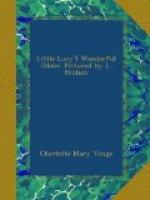“Good morning,” returned Lucy though it was not morning at all; “where do you come from?”
“Well, I’m from Paris last; but when I’m at home, I’m at Boston. I am Leonidas Saunders, of the great American Republic.”
“Oh, then you are not real, after all?”
“Real! I should hope I was a genuine article.”
“Well, I was in hopes that you were real, only you say you come from a strange country, like the rest of them, and yet you look just like an English boy.”
“Of course I do! my grandfather came from England,” said Leonidas; “we all speak English as well, or better, than you do in the old country.”
“I can’t understand it!” said Lucy; “did you come like other people, by the train, not like the children in my dreams?”
And then Leonidas explained all about it to her: how his father had brought him last year to Europe and had put him to school at Paris; but when the war broke out, and most of the stranger scholars were taken away, no orders came about him, because his father was a merchant and was away from home, so that no one ever knew whether the letters had reached him.
So Leonidas had gone on at school without many tasks to learn, to be sure, but not very comfortable: it was so cold, and there was no wood to burn; and he disliked eating horses and cats and rats, quite as much as Coralie did, though he was not in a part of the town where so many shells from the cannons came in.
At last when Lucy’s uncle and some other good gentlemen with the red cross on their sleeves, obtained leave to enter Paris and take some relief to the poor, sick people in the hospitals, the people Leonidas was with, told the gentleman that there was a little American left behind in their house.
Mr. Seaman, which was Uncle Joe’s name, went to see about him, and found that he had once known his father. So, after a great deal of trouble, it had been managed that the boy should be allowed to leave the city. He had been driven in a coach, he told Lucy, with some more Americans and English, and with flags with stars and stripes or else Union Jacks all over it; and whenever they came to a French sentry, or afterwards to a Prussian, they were stopped till he called an officer who looked at their papers and let them go on.
Mr. Seaman had taken charge of Leonidas, and given him the best dinner he had eaten for a long time, but as he was going to another city to other hospitals, he could not keep the boy with him; so he had put him in charge of a friend who was going to London, to send him down to Mrs. Bunker.
Fear of Lucy’s rash was pretty well over now, and she was to go home in a day or two; so the children were allowed to be together, and enjoyed it very much. Lucy told about her dreams, and Leonidas had a good deal to tell of what he had really seen on his travels. They wished very much that they could both see one of these wonderful dreams together, only—what should it be?




